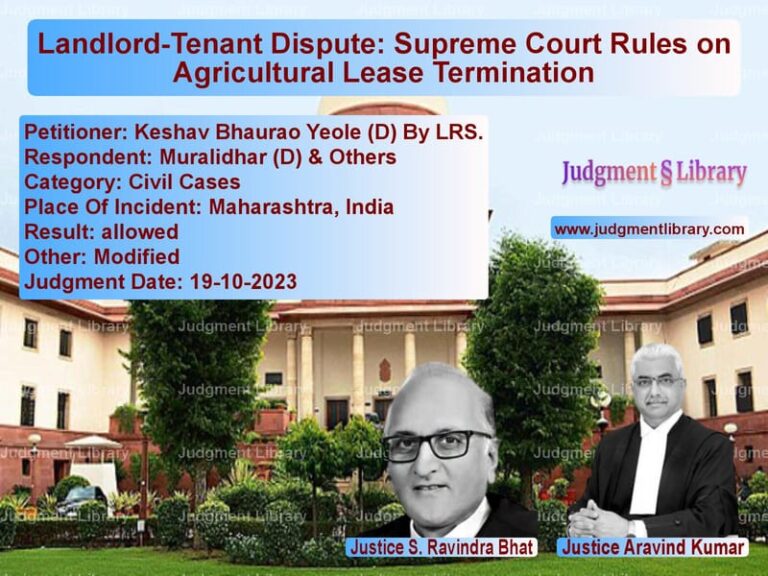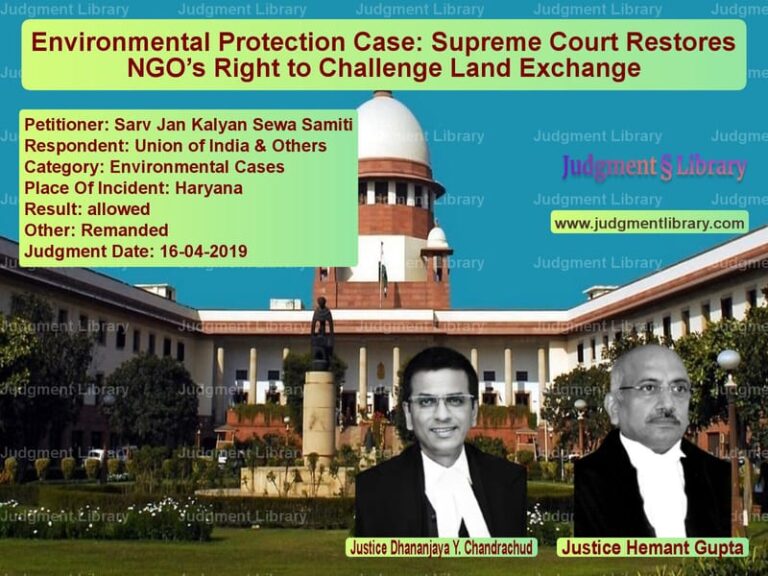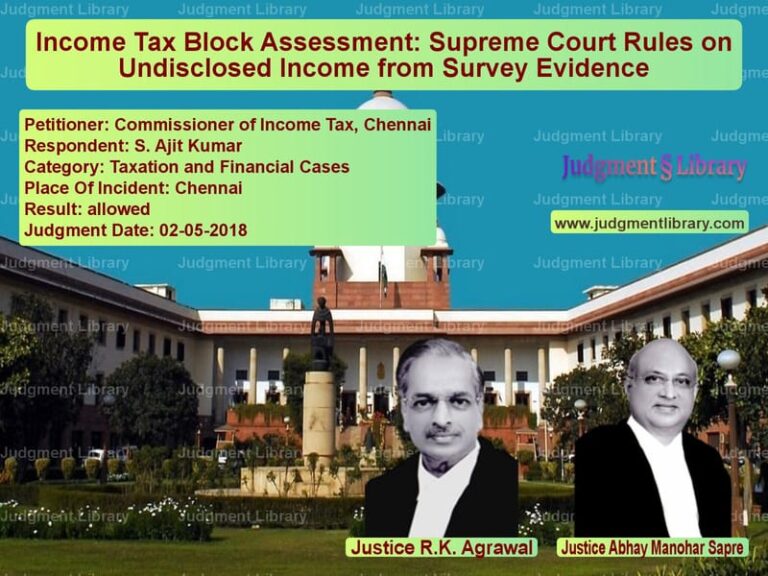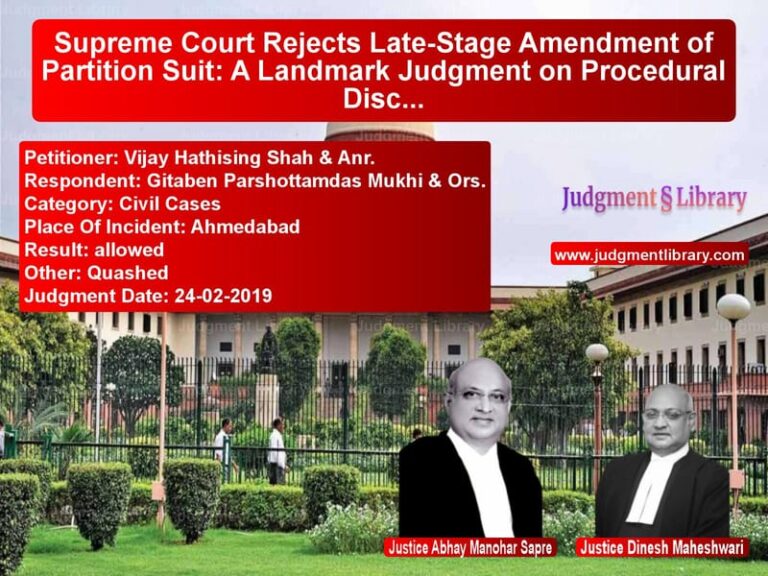Supreme Court Strikes Down Allahabad High Court’s Orders on Judicial Benefits and Contempt
The Supreme Court of India recently delivered a landmark ruling in The State of Uttar Pradesh & Ors. vs. Association of Retired Supreme Court and High Court Judges at Allahabad & Ors. This case dealt with judicial independence, separation of powers, and the scope of contempt jurisdiction. The case arose from the Allahabad High Court’s directives concerning post-retirement benefits for former judges and the initiation of criminal contempt proceedings against state officials.
Background of the Case
The dispute began when the Association of Retired Supreme Court and High Court Judges at Allahabad filed a writ petition in 2011 seeking an increase in allowances for former judges of the High Court. The petition was based on the Supreme Court’s 2014 ruling in P. Ramakrishnan Raju vs. Union of India, which encouraged states to formulate schemes similar to Andhra Pradesh’s for providing post-retirement benefits to judges.
In response to the petition, the Uttar Pradesh government issued a Government Order in 2018 that increased domestic help allowances for retired Chief Justices and High Court judges. However, in 2023, the Allahabad High Court ordered the government to notify new rules framed by the Chief Justice of the High Court, which mandated additional benefits.
Legal Issues and Government’s Objections
The State of Uttar Pradesh opposed the directive on several grounds:
- The High Court had no legal authority to mandate rulemaking on judicial benefits.
- The Chief Justice of the High Court lacked the power under Article 229 of the Constitution to frame binding rules for retired judges.
- The state government had discretion in deciding judicial benefits and could not be forced to adopt a particular scheme.
- The High Court’s initiation of criminal contempt proceedings against government officials for resisting its order was a misuse of judicial power.
High Court’s Response and Contempt Proceedings
When the state government refused to comply, the Allahabad High Court initiated criminal contempt proceedings against several senior officials, including the Chief Secretary. The court issued bailable warrants, ordered the arrest of some officials, and directed them to be taken into custody.
The officials filed a recall application, explaining that the High Court had exceeded its jurisdiction and that the proposed rules were beyond the scope of Article 229. Instead of considering these objections, the High Court ruled that the recall application itself was “contemptuous” and reinforced its directives.
Supreme Court’s Judgment
The Supreme Court ruled in favor of the Uttar Pradesh government, delivering a strongly worded judgment that emphasized the importance of judicial restraint and the separation of powers. The Court’s key findings were:
- “The High Court did not have the power to direct the State Government to notify Rules proposed by the Chief Justice pertaining to post-retiral benefits for former Judges of the High Court.”
- Article 229 of the Constitution does not grant Chief Justices the authority to frame rules governing retired judges’ benefits.
- The High Court’s mandamus directing the state to implement rules was unconstitutional and violated the separation of powers.
- The state’s recall application was a legitimate legal remedy, and invoking criminal contempt against officials for filing it was an abuse of judicial power.
- Summoning government officials repeatedly, instead of relying on affidavits and legal submissions, should be avoided.
Standard Operating Procedure for Summoning Government Officials
Recognizing the overreach in summoning government officials to court, the Supreme Court laid down a Standard Operating Procedure (SOP) to ensure that such directives are issued only when necessary. The key principles of this SOP include:
- Officials should not be summoned unless absolutely necessary for the resolution of a case.
- Courts must first seek compliance through affidavits and video conferencing before directing physical presence.
- Personal presence should be mandated only when officials have failed to provide adequate responses or deliberately misrepresented facts.
- Government decisions should be challenged through appropriate legal channels rather than through coercion via contempt proceedings.
Implications of the Judgment
This ruling reinforces the principle that courts must respect executive discretion in policymaking while ensuring judicial accountability. It also establishes a clear precedent against judicial overreach in compelling government action and initiating contempt proceedings without just cause.
By striking down the High Court’s orders, the Supreme Court has reaffirmed the constitutional doctrine of separation of powers and the necessity of judicial restraint in administrative matters.
Petitioner Name: The State of Uttar Pradesh & Ors..Respondent Name: Association of Retired Supreme Court and High Court Judges at Allahabad & Ors..Judgment By: Justice Dhananjaya Y Chandrachud, Justice J B Pardiwala, Justice Manoj Misra.Place Of Incident: Allahabad.Judgment Date: 03-01-2024.
Don’t miss out on the full details! Download the complete judgment in PDF format below and gain valuable insights instantly!
Download Judgment: the-state-of-uttar-p-vs-association-of-retir-supreme-court-of-india-judgment-dated-03-01-2024.pdf
Directly Download Judgment: Directly download this Judgment
See all petitions in Constitution Interpretation
See all petitions in Separation of Powers
See all petitions in Fundamental Rights
See all petitions in Judgment by Dhananjaya Y Chandrachud
See all petitions in Judgment by J.B. Pardiwala
See all petitions in Judgment by Manoj Misra
See all petitions in allowed
See all petitions in Quashed
See all petitions in supreme court of India judgments January 2024
See all petitions in 2024 judgments
See all posts in Constitutional Cases Category
See all allowed petitions in Constitutional Cases Category
See all Dismissed petitions in Constitutional Cases Category
See all partially allowed petitions in Constitutional Cases Category







